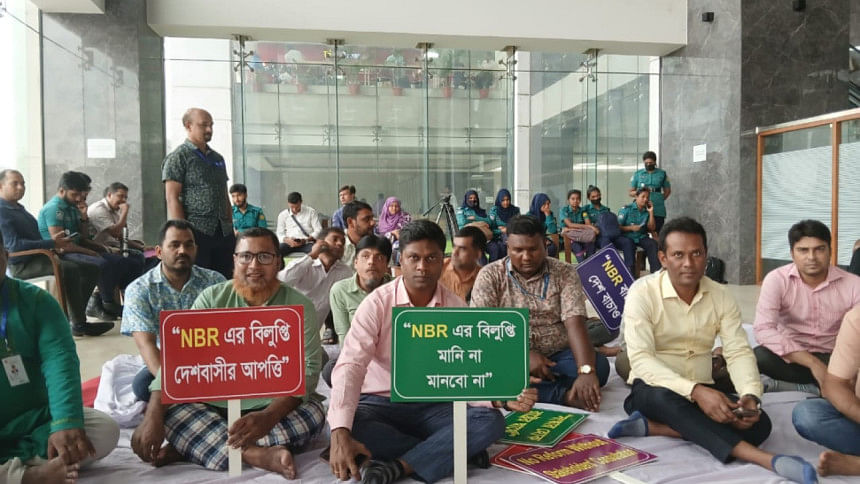Who will pay for the NBR turmoil?

The National Board of Revenue (NBR), Bangladesh's top tax machinery that is responsible for more than 85 percent of the country's domestic revenue, almost ground to a halt over the last few days. It faced a near paralysis over the recent NBR bifurcation ordinance. Office activities were almost halted, with protests by its employees intensifying, with the fiscal clock ticking and the budget knocking on the door.
The protest erupted following the issuance of an ordinance on May 12 that legally disbanded the NBR and the Internal Resources Division (IRD), replacing them with two separate entities: Revenue Policy Division and Revenue Management Division. The disgruntled NBR employees had planned to go on a complete shutdown in all the revenue offices countrywide, including export-import assessment on sea, land and air routes, from today, but after receiving assurances from the government, they decided to put their work abstention programme on hold, according to a press release they issued last night.
Framed as a long-overdue step in the modernisation of the country's tax system—driven in part by the IMF conditions—the move has run into fierce bureaucratic resistance. Two questions now loom large: i) who will pay for the NBR turmoil?; and ii) when will this deadlock end?
Revenue paralysis comes at a cost
The protest cast a shadow over the NBR's revenue goals. In the first 10 months of the 2024-25 fiscal year, the tax authority collected Tk 2.85 lakh crore, reflecting a low year-on-year growth of nearly three percent, according to provisional data. Despite lowering the revenue target for FY2025 by Tk 18,500 crore, the NBR still has to collect Tk 178,500 crore by the end of June this year to meet the Tk 463,500 crore target. If the protesters resume their work abstention, it poses a clear risk to meeting that goal.
Moreover, the NBR is likely to miss its revenue target tied to the IMF's conditions, which require collecting nearly Tk 4.55 lakh crore by June this year and raising the tax-to-GDP ratio to 7.9 percent within that time frame.
Typically, the final two to three months of the fiscal year are critical for the NBR, during which it collects around Tk 40,000-50,000 crore per month. This momentum has been clearly disrupted this year.
However, even with essential services spared, the bulk of domestic revenue operations would be under strain if the revenue operations shut down completely. Already, over the past few days of protests, businesses saw delays in cargo release, and tax refunds were held up. New compliance drives were suspended. That means less money flowed into government coffers just as Bangladesh prepared for a challenging national budget.
So, it is not the protesting officers, nor the reform architects or top bureaucrats who would feel the impact of the NBR turmoil. In essence, the fiscal burden of this administrative standoff would fall squarely on the shoulders of the citizens, who already are burdened by inflation, with the consumer price index remaining above nine percent for the past 26 months. It would be the businesses who would be unable to clear goods on time and be forced to bear mounting demurrage charges. And if export activities are disrupted, it will inevitably hurt the country's foreign currency reserves. In the long run, the credibility of Bangladesh's entire reform agenda might suffer the most.
A reform without proper consultation?
The proposed reform, backed by global lenders like the IMF and World Bank follows a sound principle: separate policy design from implementation. But the execution has been anything but inclusive. The NBR Reform Unity Council, the platform of NBR officers and employees, claims that the government bypassed the experienced revenue officers, opening the door for other government service cadres including admin cadres. Even the Revenue Reform Advisory Committee—tasked with designing the restructuring—has publicly disavowed the final ordinance.
Protesters are calling not just for a rollback or repeal, but also the NBR chairman's removal and full disclosure of the advisory report. In their eyes, this is not reform. It's a hostile takeover of one of Bangladesh's most technical institutions.
Fortunately, the government has issued statements assuring that it would amend the ordinance, and NBR wouldn't be dissolved before the amendment is done, which will happen only after discussion with all the stakeholders. Following that, the protesters also issued a statement announcing that they were withdrawing their work abstention programme. However, they remain firm on their core demands, which include resignation of the chairman, and they said they would continue non-cooperation with the chairman.
So what's next?
There are no winners in a prolonged bureaucratic standoff. The protesters aren't opposing the separation itself as they want the NBR reformed, not dissolved. Their demand is to restructure it as an independent commission or division, led by officials from the revenue cadre.
With the national budget proposal set to be announced on June 2, both local and foreign investors have begun expressing concern over the unfolding situation. If this crisis is allowed to fester, it risks further dysfunction within one of the country's most critical economic engines. Investors will take note. Development partners will raise eyebrows. And taxpayers will grow more cynical—possibly further weakening an already fragile tax compliance.
A delegation of the protesters submitted a memorandum to the Chief Adviser's Office on Thursday to press their four-point demand, including repeal of the ordinance and removal of the NBR chairman. This crisis will only be resolved if both sides return to the table—and Chief Adviser Prof Muhammad Yunus plays a critical role in resolving the turmoil through an open dialogue. Publishing the advisory committee's report and re-engaging stakeholders in genuine consultation could help dispel suspicion and rebuild trust.
Bangladesh cannot afford a broken tax system, especially now. The sooner this crisis is resolved, the less damage it will have on an already strained fiscal landscape.
Md Asaduz Zaman is a business journalist at The Daily Star. He can be reached at [email protected].
Views expressed in this article are the author's own.
Follow The Daily Star Opinion on Facebook for the latest opinions, commentaries and analyses by experts and professionals. To contribute your article or letter to The Daily Star Opinion, see our guidelines for submission.

 For all latest news, follow The Daily Star's Google News channel.
For all latest news, follow The Daily Star's Google News channel. 











Comments